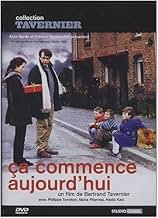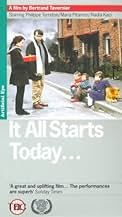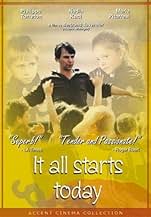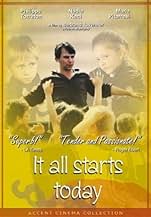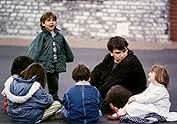AVALIAÇÃO DA IMDb
7,4/10
3 mil
SUA AVALIAÇÃO
Adicionar um enredo no seu idiomaA teacher from a small, depressed town is trying to do something useful.A teacher from a small, depressed town is trying to do something useful.A teacher from a small, depressed town is trying to do something useful.
- Direção
- Roteiristas
- Artistas
- Prêmios
- 12 vitórias e 8 indicações no total
- Direção
- Roteiristas
- Elenco e equipe completos
- Produção, bilheteria e muito mais no IMDbPro
Avaliações em destaque
It always happens. When things get tough, local, State, and the federal government save money on the backs of the poor first. Who, besides the poor suffer, the teachers, of course? This is a magnificent story of pre-school teachers coping with abuse, neglect, incest, and all forms of child abuse while the government agencies that are supposed to help just make excuses.
The school is falling apart and being broken into for food, and the school board, and the police do little or nothing to help. Families are coping with 34% unemployment and the resulting depression. Sound familiar? It is also happening all over America, not just in France.
The teacher training even tells new teachers that they will be social workers more than teachers. It is difficult to understand how learning can take place with children who are hungry, cold, and abused.
Philippe Torreton does an excellent job as Daniel Lefebvre in writer/director Bertrand Tavernier's film. His frustration and anger shows whether he is throwing out a child welfare worker or yelling at the Mayor for cutting lunches. All the while he has to deal with problems at home and his ailing father.
The school is falling apart and being broken into for food, and the school board, and the police do little or nothing to help. Families are coping with 34% unemployment and the resulting depression. Sound familiar? It is also happening all over America, not just in France.
The teacher training even tells new teachers that they will be social workers more than teachers. It is difficult to understand how learning can take place with children who are hungry, cold, and abused.
Philippe Torreton does an excellent job as Daniel Lefebvre in writer/director Bertrand Tavernier's film. His frustration and anger shows whether he is throwing out a child welfare worker or yelling at the Mayor for cutting lunches. All the while he has to deal with problems at home and his ailing father.
7=G=
"It All Starts Today" is an open ended slice-of-life tale which takes us into the world of a good-hearted, dedicated, and hard working French Kindergarten teacher who has a lot more on his plate than finger painting. Protag Daniel (Torrenton) not only teaches but runs interference for abused kids, wrestles with the local mayor for funding, contends with vandals, and juggles a host of economic, social, and school political issues all the while maintaining a relationship with his girl friend and her son. Though there isn't much of an arc to the story, this well crafted film does create a likeable character who shows us that the opportunity for heroism exists everywhere in life...even kindergarten. (B)
One of those films about human stories that touches you since the very first moment. Those who like real human stories with something deep and authentic to say must see this movie. Touching performance by its main character Phillipe Torreton and amazingly realistic performance by the children appearing, many times 20 or 30 at same time. If you want to see pure cinema and identify with the characters, this a must see for you
"Teaching tugs at the heart, opens the heart, even breaks the heart, And the more one loves teaching, the more heartbreaking it can be." - Parker Palmer, a veteran educator
Daniel Lefebvre (Philippe Torreton) is teacher and director of the école maternelle, a pre-school open to children ages 2 to 6 in northern France. In Bernard Tavernier's deeply moving film, It All Starts Today, the children are the stars. Their faces and loving smiles shine through the grimness of their circumstances. Based on the notebooks of Tavernier's son-in-law Dominique Sampiero, a provincial teacher, the film is about the difficulties and challenges of children but is also a tribute to the courage and commitment of teachers. Lefebvre is a poet whose voice-over narration adds a touching lyricism to the film. "We'll tell our children it was hard", he writes. "Piles of stones placed one by one. We'll tell the children it was hard but their fathers are lords and this is their legacy. A pile of stones and the courage to lift them".
The school is in a town that has been hit hard by the closure of the coal mine, and where unemployment has reached 34 percent. Lefebvre is a gentle and compassionate teacher but a tough administrator who tries to shake the political bureaucracy into providing adequate programs for the school. He protests loudly against budget cuts and insensitive government regulations and the shortage of trained professionals. Lefebvre shows anger and frustration in the scene where he slams the door in the face of a visiting social worker, and when he storms into the Mayor's office to rail against cutbacks in the school lunch program. He is hardest on himself, however, when tragedy befalls an alcoholic mother and her family, and when his common-law wife Valeria's (Maria Pitteresi) young son Remi (Lambert Marchal) gets into trouble, challenging his commitment to return to the school the following year.
The problems of the school are severe but not exaggerated. Being the husband of a pre-school teacher I know the kinds of circumstances that parents and teachers face every day and they are not that different from those shown in the film. Tavernier does not idealize the poor or romanticize their circumstances but shows us conditions as they exist. This is a message film and we do get the message, but it doesn't seem preachy because it comes from a passion that springs naturally from the lives of the characters. But the magic of the film lies in the children themselves. There is no acting or interpretation. The camera zooms around the school with lightning speed catching the spontaneity of the children singing, dancing, talking, playing, and just being themselves. It All Starts Today does not offer any simple solutions and can be dark, but, at the end, when each child comes up to the camera for a final smile I felt only lightness and joy. Being around children and adults with courage will do that.
Daniel Lefebvre (Philippe Torreton) is teacher and director of the école maternelle, a pre-school open to children ages 2 to 6 in northern France. In Bernard Tavernier's deeply moving film, It All Starts Today, the children are the stars. Their faces and loving smiles shine through the grimness of their circumstances. Based on the notebooks of Tavernier's son-in-law Dominique Sampiero, a provincial teacher, the film is about the difficulties and challenges of children but is also a tribute to the courage and commitment of teachers. Lefebvre is a poet whose voice-over narration adds a touching lyricism to the film. "We'll tell our children it was hard", he writes. "Piles of stones placed one by one. We'll tell the children it was hard but their fathers are lords and this is their legacy. A pile of stones and the courage to lift them".
The school is in a town that has been hit hard by the closure of the coal mine, and where unemployment has reached 34 percent. Lefebvre is a gentle and compassionate teacher but a tough administrator who tries to shake the political bureaucracy into providing adequate programs for the school. He protests loudly against budget cuts and insensitive government regulations and the shortage of trained professionals. Lefebvre shows anger and frustration in the scene where he slams the door in the face of a visiting social worker, and when he storms into the Mayor's office to rail against cutbacks in the school lunch program. He is hardest on himself, however, when tragedy befalls an alcoholic mother and her family, and when his common-law wife Valeria's (Maria Pitteresi) young son Remi (Lambert Marchal) gets into trouble, challenging his commitment to return to the school the following year.
The problems of the school are severe but not exaggerated. Being the husband of a pre-school teacher I know the kinds of circumstances that parents and teachers face every day and they are not that different from those shown in the film. Tavernier does not idealize the poor or romanticize their circumstances but shows us conditions as they exist. This is a message film and we do get the message, but it doesn't seem preachy because it comes from a passion that springs naturally from the lives of the characters. But the magic of the film lies in the children themselves. There is no acting or interpretation. The camera zooms around the school with lightning speed catching the spontaneity of the children singing, dancing, talking, playing, and just being themselves. It All Starts Today does not offer any simple solutions and can be dark, but, at the end, when each child comes up to the camera for a final smile I felt only lightness and joy. Being around children and adults with courage will do that.
Don't settle down for a comfortable couple of hours easy entertainment. This film carries a message and it will thrash you with it. This is not a film with a stylised story set out in the classical beginning-middle-ending formula; it is a film which swings from scene to scene, at times hectically, with splendid unrehearsed sequences shot with continual changes and panning at frequently too high speed, swinging from schoolmaster to clusters of young faces, zooming in on one, lifting up to worried mothers bursting in, and back down to the schoolmaster, at trepidating speed, breathlessly, at whatever price, because the important thing was to get it all as it happened, how it happened; no way of organising thirty little kids to do the scene again: it would be just too artificial and useless.
The price is some lack of focussing, but it is worth the end result: Alain Choquart under Tavernier's orders achieves something monumental, something magical as his agility with the camera swoops around the school capturing every taut smile, every nervous finger-twisting, the first tears from a hysterical mother... Bertrand Tavernier comes out of that French school of film-making to which he adhered for most of his earlier output and from which he tried to break away with risky excursions into adventure cinema in 'La Fille DE D'Artagnan' (which must have worried Alexandre Dumas) and 'Capitaine Conan' (which must have worried quite a lot of people), as if in a desperate attempt to reach Hollywood-tradition epic proportions.
With 'Ça commence aujourd'hui' everything comes back to earth with a rather nasty bump: Tavernier gets down to the gritty bits of sordid suburbs on the edge of an industrial city (Lille) where in most families the father of the household is either out of work, or drunk, or both, or has run away; the local schoolmaster takes it on himself to fill the rôle of father, a job which Phillipe Torreton carries out brilliantly, aided and abetted by his girl-friend, Maria Pitarresi, who doesn't.
But perhaps the brilliance of the film resides in the sheer pace, as the cameraman has to keep his wits about him so as not to lose those gestures, in what must be the nearest thing to live, unrehearsed cinema: above all in the rapid shots among the small children, where there is no acting or interpretation - it is all too direct, too immediate for any kind of infantile amateur acting classes.
There may be a few technical weaknesses due to the way in which the film just had to be made, but the end result is monumental, a brilliant though agonising document.
Every European politician should be forced to see it: maybe a few of them would wake up and decide to do something useful.
The price is some lack of focussing, but it is worth the end result: Alain Choquart under Tavernier's orders achieves something monumental, something magical as his agility with the camera swoops around the school capturing every taut smile, every nervous finger-twisting, the first tears from a hysterical mother... Bertrand Tavernier comes out of that French school of film-making to which he adhered for most of his earlier output and from which he tried to break away with risky excursions into adventure cinema in 'La Fille DE D'Artagnan' (which must have worried Alexandre Dumas) and 'Capitaine Conan' (which must have worried quite a lot of people), as if in a desperate attempt to reach Hollywood-tradition epic proportions.
With 'Ça commence aujourd'hui' everything comes back to earth with a rather nasty bump: Tavernier gets down to the gritty bits of sordid suburbs on the edge of an industrial city (Lille) where in most families the father of the household is either out of work, or drunk, or both, or has run away; the local schoolmaster takes it on himself to fill the rôle of father, a job which Phillipe Torreton carries out brilliantly, aided and abetted by his girl-friend, Maria Pitarresi, who doesn't.
But perhaps the brilliance of the film resides in the sheer pace, as the cameraman has to keep his wits about him so as not to lose those gestures, in what must be the nearest thing to live, unrehearsed cinema: above all in the rapid shots among the small children, where there is no acting or interpretation - it is all too direct, too immediate for any kind of infantile amateur acting classes.
There may be a few technical weaknesses due to the way in which the film just had to be made, but the end result is monumental, a brilliant though agonising document.
Every European politician should be forced to see it: maybe a few of them would wake up and decide to do something useful.
Você sabia?
- CuriosidadesCo-screenwriter Dominique Sampiero was Bertrand Tavernier's son-in-law. He was also a headmaster and drew on over 20 years experience for the screenplay.
- ConexõesFeatured in In the Shadow of Hollywood (2000)
Principais escolhas
Faça login para avaliar e ver a lista de recomendações personalizadas
- How long is It All Starts Today?Fornecido pela Alexa
Detalhes
Bilheteria
- Faturamento bruto nos EUA e Canadá
- US$ 12.348
- Fim de semana de estreia nos EUA e Canadá
- US$ 2.639
- 29 de set. de 2000
Contribua para esta página
Sugerir uma alteração ou adicionar conteúdo ausente

Principal brecha
By what name was Quando Tudo Começa (1999) officially released in India in English?
Responda
![Assistir a Bande-annonce [OV]](https://m.media-amazon.com/images/M/MV5BNzNjNjkwYzEtOGRjOS00MGM2LWIwMDMtYmExMTE2YmY1MDgwXkEyXkFqcGdeQXRyYW5zY29kZS13b3JrZmxvdw@@._V1_QL75_UX500_CR0)
